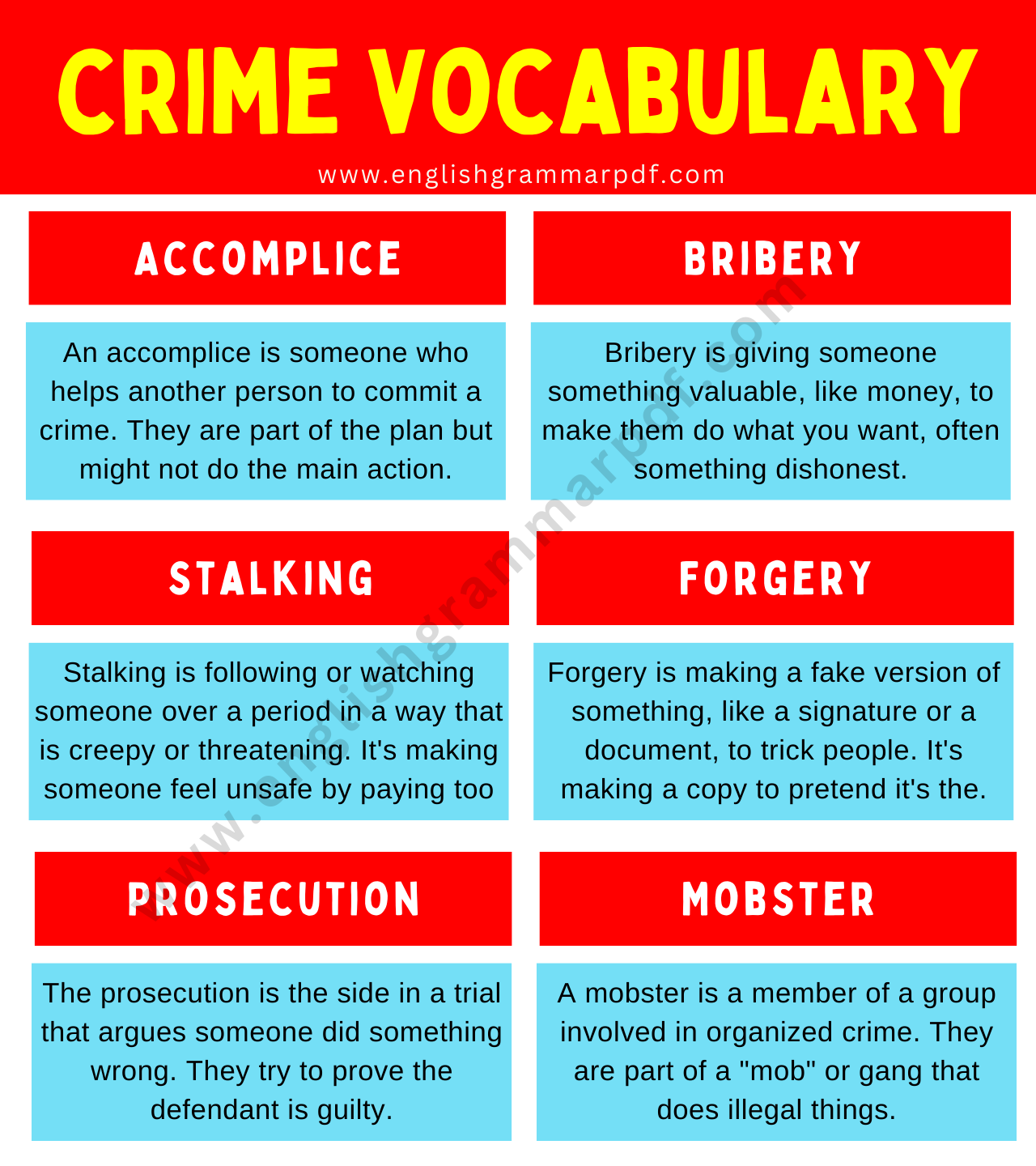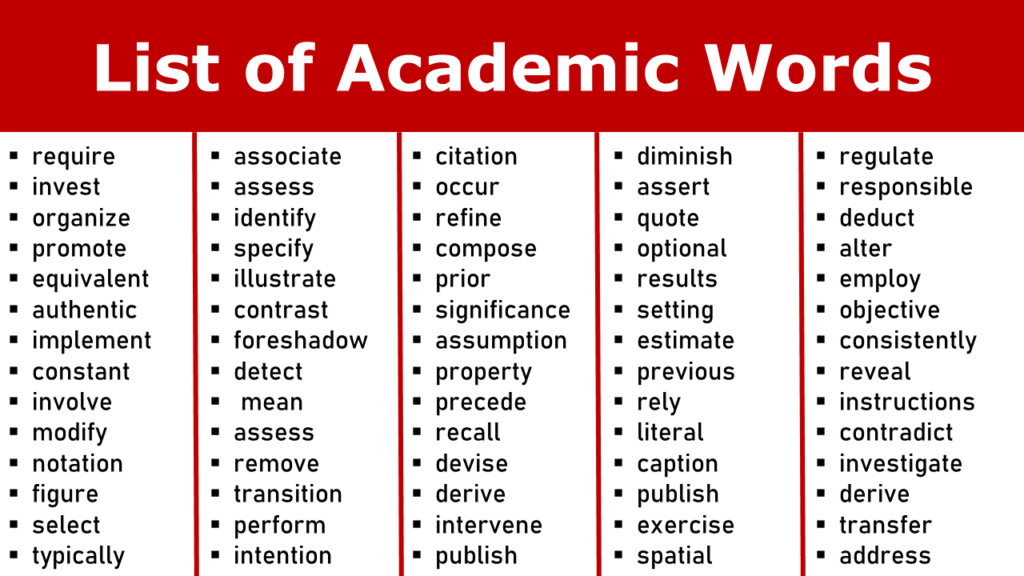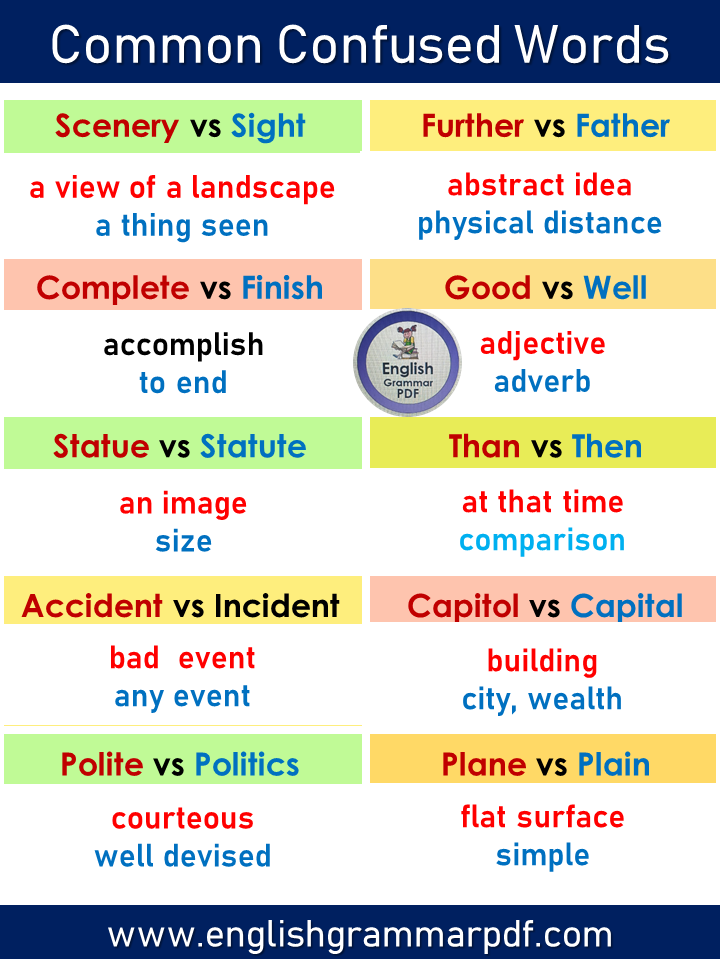Crime is something that happens when someone breaks the law, which are the rules that all people in a place must follow. When someone does something wrong, like stealing or hurting someone, it is called a crime. It’s important to know some words about crime, especially if you are learning English. These words can help you understand news stories, books, and movies better.
Crime Vocabulary Words
Here is a list of 100 words related to crime that can help you learn and improve your English:
1. Accomplice
An accomplice is someone who helps another person to commit a crime. They are part of the plan but might not do the main action.
2. Alibi
An alibi is proof that someone was somewhere else when a crime happened. It shows they couldn’t have done it.
3. Arson
Arson means setting fire to a place or thing on purpose. It’s a serious crime because it can hurt people and damage things.
4. Assault
Assault is when someone attacks another person. It can be hitting, pushing, or anything that harms someone else.
5. Bail
Bail is money that a court asks for to let a person wait outside of jail until their trial. It’s like a promise they’ll come back for the trial.
6. Battery
Battery is like assault, but it means actually causing harm to someone. It’s when the attack leads to injuries.
7. Blackmail
Blackmail is when someone threatens to share secrets unless they get something, like money. It’s a way of using information to control others.
8. Bribery
Bribery is giving someone something valuable, like money, to make them do what you want, often something dishonest.
9. Burglary
Burglary is when someone breaks into a place, like a house, to steal things. It’s entering a place without permission to take something.
10. Carjacking
Carjacking is stealing a car by force. It’s when someone takes someone else’s car by threatening or harming them.
11. Convict
A convict is someone who has been found guilty of a crime by a court. It’s a person who has been proven to have done something wrong.
12. Counterfeit
Counterfeit means making fake copies of something, like money or a product, to trick people. It’s making a copy to pretend it’s real.
13. Culprit
The culprit is the person who did something wrong or committed a crime. It’s another word for the person who is responsible for the bad action.
14. Defendant
A defendant is someone who is being accused of a crime in court. They have to defend themselves against the charges.
15. Embezzlement
Embezzlement is taking money that you were trusted to take care of, usually in a job, and using it for yourself. It’s like stealing from your workplace.
16. Extortion
Extortion is making someone do something or give you something by threatening them. It’s like blackmail but can involve threats of harm.
17. Felony
A felony is a very serious crime, like robbery or murder. These crimes usually have more severe punishments.
18. Forgery
Forgery is making a fake version of something, like a signature or a document, to trick people. It’s making a copy to pretend it’s the original.
19. Fraud
Fraud is tricking someone to gain something, often money. It involves lying or deceiving people.
20. Homicide
Homicide is when one person kills another. It can be a crime like murder, or sometimes it might be considered legal, like in self-defense.
21. Incarceration
Incarceration means being put in jail or prison. It’s when someone is locked up because they broke the law.
22. Indictment
An indictment is when a group of people, called a grand jury, decide there is enough evidence to charge someone with a crime. It’s the formal accusation.
23. Infraction
An infraction is a small breaking of the rules, like a traffic ticket. It’s less serious than a felony or misdemeanor.
24. Interrogation
Interrogation is when police ask someone questions to find out information about a crime. It’s a formal way of questioning.
25. Jailbreak
A jailbreak is when someone escapes from jail. It’s breaking out of a place where they were locked up.
26. Kidnapping
Kidnapping is taking someone away against their will, often to ask for money in return. It’s like stealing a person.
27. Larceny
Larceny is a legal term for stealing or theft. It’s taking someone else’s things without permission.
28. Laundering
Laundering, often called “money laundering,” is hiding where illegal money came from. It’s making dirty money look clean.
29. Manslaughter
Manslaughter is killing someone without planning to do it ahead of time. It’s less severe than murder but still very serious.
30. Misdemeanor
A misdemeanor is a crime that’s not as serious as a felony. It’s something wrong that has a less severe punishment.
31. Mobster
A mobster is a member of a group involved in organized crime. They are part of a “mob” or gang that does illegal things.
32. Mugging
Mugging is attacking someone to steal from them, usually in a public place. It’s like a robbery but happens outside, like on the street.
33. Narcotics
Narcotics are illegal drugs or controlled medicines. It’s a word for substances that are not allowed without special permission.
34. Obstruction
Obstruction is getting in the way of something, like a police investigation. It’s trying to stop something from happening.
35. Offender
An offender is someone who has committed a crime or broken a rule. It’s a general word for someone who does something wrong.
36. Parole
Parole is when someone who was in prison is allowed to leave early, but they have to follow certain rules. It’s like a second chance with conditions.
37. Perjury
Perjury is lying when you have sworn to tell the truth, especially in court. It’s a serious crime to lie under oath.
38. Pickpocket
A pickpocket is someone who steals things from people’s pockets or bags without them noticing. It’s a sneaky way of stealing.
39. Plaintiff
The plaintiff is the person who starts a lawsuit in civil court, claiming someone else did something wrong to them. They are asking for something, like money, to fix it.
40. Plea
A plea is an answer to a charge in court, like saying “guilty” or “not guilty.” It’s what the defendant says about the accusation.
41. Poaching
Poaching is hunting animals illegally, often in a protected area or of a protected species. It’s breaking the rules about hunting.
42. Probation
Probation is a period when a person must behave well instead of going to jail. They have to follow certain rules to avoid being locked up.
43. Prosecution
The prosecution is the side in a trial that argues someone did something wrong. They try to prove the defendant is guilty.
44. Racketeering
Racketeering involves running illegal businesses or schemes, often as part of organized crime. It’s doing business in a criminal way.
45. Raid
A raid is a sudden attack, often by police, to arrest people or find evidence. It’s a quick action to enforce the law.
46. Ransom
Ransom is money that kidnappers ask for in return for freeing someone they have taken. It’s what they demand to release the person.
47. Recidivism
Recidivism is when someone who was in jail commits another crime and returns to jail. It’s repeating bad behavior even after being punished.
48. Robbery
Robbery is taking something from someone by using force or threats. It’s a kind of theft that is very scary for the victim.
49. Scam
A scam is a tricky plan to cheat someone, often to steal money. It’s a dishonest scheme to trick people.
50. Sentence
A sentence is the punishment that a court gives to someone who is found guilty. It can be time in jail, a fine, or something else.
51. Shoplifting
Shoplifting is stealing from a store. It’s taking things without paying for them when shopping.
52. Smuggling
Smuggling is moving things secretly to avoid laws or taxes, like bringing goods into a country without permission. It’s hiding things to move them illegally.
53. Solicitation
Solicitation is asking someone to do something illegal, like bribing a public official. It’s a request to commit a crime.
54. Stalking
Stalking is following or watching someone over a period in a way that is creepy or threatening. It’s making someone feel unsafe by paying too much attention.
55. Subpoena
A subpoena is a document that says you must come to court to testify or provide evidence. It’s an official order to show up and share what you know.
56. Surveillance
Surveillance is watching someone, often secretly, to see what they do. It’s used by the police to gather information.
57. Suspect
A suspect is someone who might have committed a crime. It’s a person the police think might be responsible.
58. Terrorism
Terrorism is using violence or threats to scare people or governments to achieve political goals. It’s a serious crime that affects many people.
59. Theft
Theft is taking someone’s property without permission. It’s a general word for stealing.
60. Trafficking
Trafficking is illegally trading things like drugs or even people. It’s moving and selling things that are not allowed.
61. Trespassing
Trespassing is being on someone’s property without permission. It’s going somewhere you’re not allowed to be.
62. Vandalism
Vandalism is damaging property on purpose, like breaking windows or painting graffiti. It’s destroying things that aren’t yours.
63. Verdict
The verdict is the decision in a trial, like “guilty” or “not guilty.” It’s what the jury or judge decides about the case.
64. Vigilante
A vigilante is someone who tries to enforce the law on their own without authority. They act like a hero but outside the law.
65. Violation
A violation is breaking a rule or law. It’s doing something that’s not allowed.
66. Warrant
A warrant is a document that lets police do something, like search a place or arrest someone. It’s permission from a judge.
67. Witness
A witness is someone who saw something happen and can tell others about it. They might speak in court to share what they know.
68. Accusation
An accusation is saying someone did something wrong. It’s like a formal charge but can be before official charges are made.
69. Appeal
An appeal is asking a higher court to review a decision to see if it was right. It’s trying to change a court’s decision.
70. Arraignment
Arraignment is the first court appearance where charges are read, and a plea is made. It’s the start of the legal process in court.
71. Coercion
Coercion is making someone do something by using force or threats. It’s a way of pressuring someone to do what you want.
72. Complicity
Complicity is being involved with others in doing something wrong. It’s like being an accomplice or part of a group doing bad things.
73. Confession
A confession is when someone admits they did something wrong, often a crime. It’s saying openly that you are responsible for a bad action.
74. Conspiracy
Conspiracy is planning with others to do something illegal. It’s like making a secret plan to break the law.
75. Conviction
A conviction is when someone is officially found guilty of a crime. It’s the result of a trial where they are proven to have done something wrong.
76. Cross-examination
Cross-examination is asking questions to test if someone’s story is true during a trial. It’s a way of checking the facts in court.
77. Detention
Detention is being kept in a place, like jail or a detention center, especially while waiting for a trial. It’s being held by authorities.
78. Entrapment
Entrapment is when police trick someone into committing a crime they wouldn’t usually do. It’s a controversial way of catching criminals.
79. Evasion
Evasion is avoiding something you’re supposed to do, like paying taxes. It’s dodging a responsibility or duty.
80. Extradition
Extradition is sending someone back to the place where they’re accused of a crime to face trial. It’s like returning a suspect to where the crime happened.
81. Felon
A felon is someone who has committed a felony, a serious crime. It’s a term for people found guilty of major offenses.
82. Fugitive
A fugitive is someone running away to avoid being caught, often after committing a crime. It’s a person who is trying to escape the law.
83. Hearsay
Hearsay is information that someone heard from someone else, not something they know directly. It’s often not allowed as evidence in court.
84. Indictable
Indictable refers to a crime serious enough to require a formal charge by a grand jury. It’s used for more severe offenses.
85. Infringement
Infringement is breaking the terms of a law or agreement. It’s like violating a rule or not respecting someone’s rights.
86. Injunction
An injunction is a court order that stops someone from doing something or forces them to do something. It’s like a legal command.
87. Insanity plea
An insanity plea is when someone says they were insane when they committed a crime and didn’t know right from wrong. It’s a defense in court.
88. Jeopardy
In law, jeopardy means being at risk of punishment for a crime. “Double jeopardy” means you can’t be tried twice for the same crime.
89. Jurisdiction
Jurisdiction is the area where a court or law enforcement has authority. It’s like the territory where their power applies.
90. Juvenile
A juvenile is a young person, often under 18, who might be treated differently in the legal system. It’s a term for younger people in law.
91. Libel
Libel is writing something false about someone that harms their reputation. It’s like slander, but in writing.
92. Malfeasance
Malfeasance is doing something illegal or wrong, especially by a public official. It’s bad behavior by someone in power.
93. Mitigation
Mitigation is making something less severe, like a punishment. It’s trying to make the consequences less harsh.
94. Mole
A mole is someone who secretly gathers information to give to others, often in a spy or criminal context. It’s a secret informer.
95. Notary
A notary is someone with legal authority to witness signatures and certify documents. They help make sure documents are genuine.
96. Obstruction of justice
Obstruction of justice is doing something that hinders a legal process, like an investigation. It’s getting in the way of the law.
97. Perpetrator
The perpetrator is the person who committed a crime or did something wrong. It’s another word for the person who is responsible for a bad action.
98. Probable cause
Probable cause is a good reason for police to believe someone might be involved in a crime. It’s what they need to search or arrest someone.
99. Restitution
Restitution is paying money to someone for harm or loss caused. It’s like making up for what was done by giving something back.
100. Slander
Slander is saying something false about someone that harms their reputation. It’s like libel but spoken, not written.



